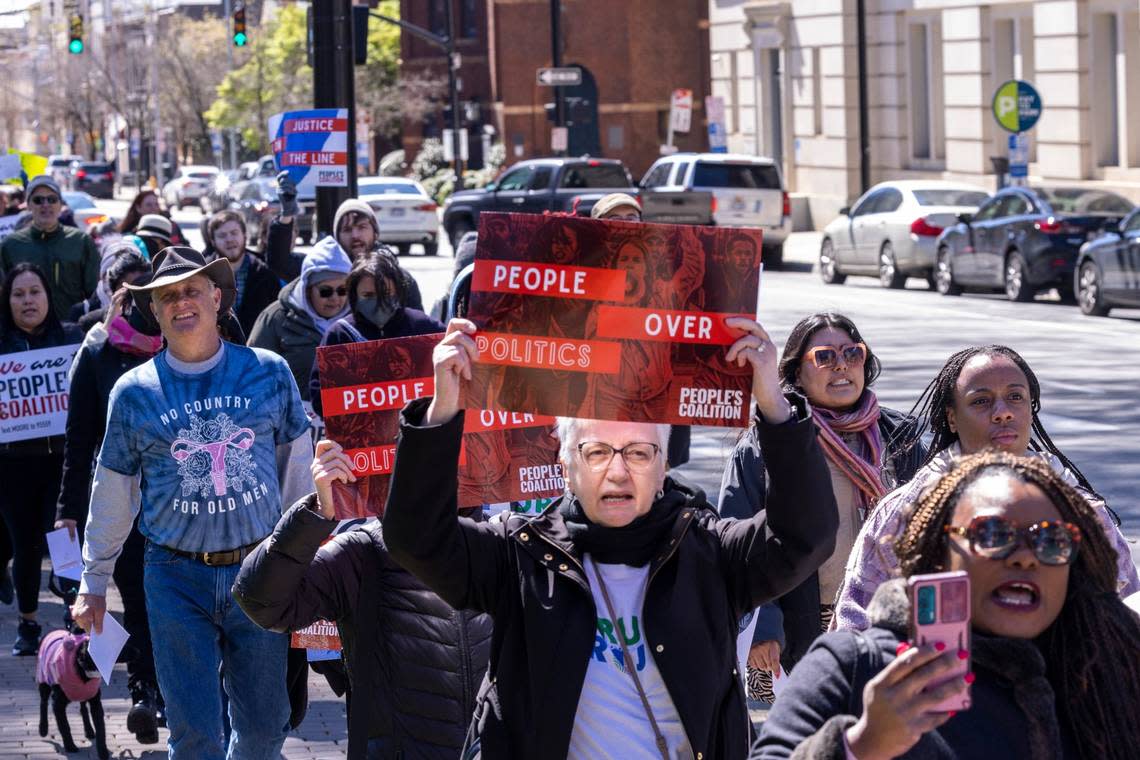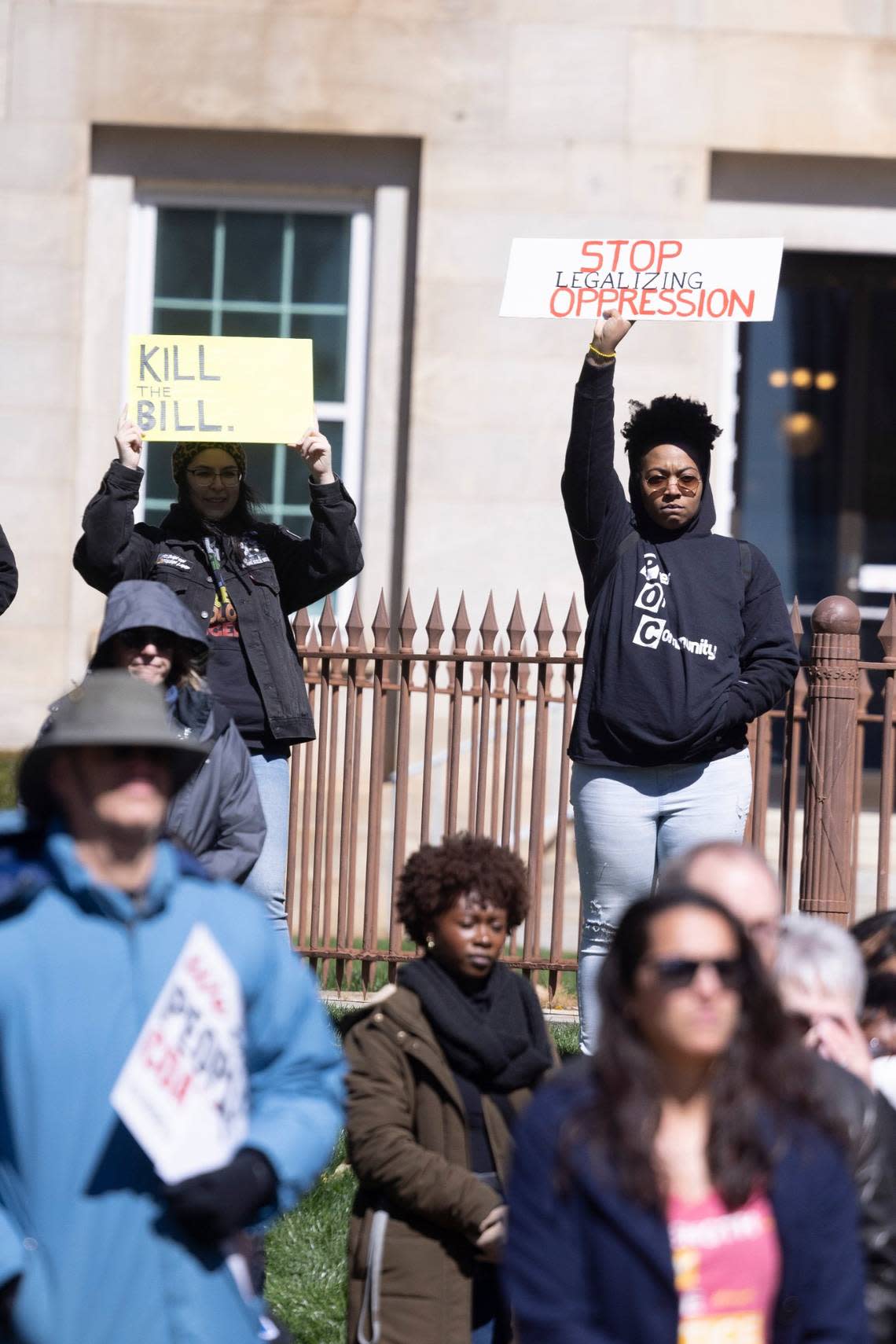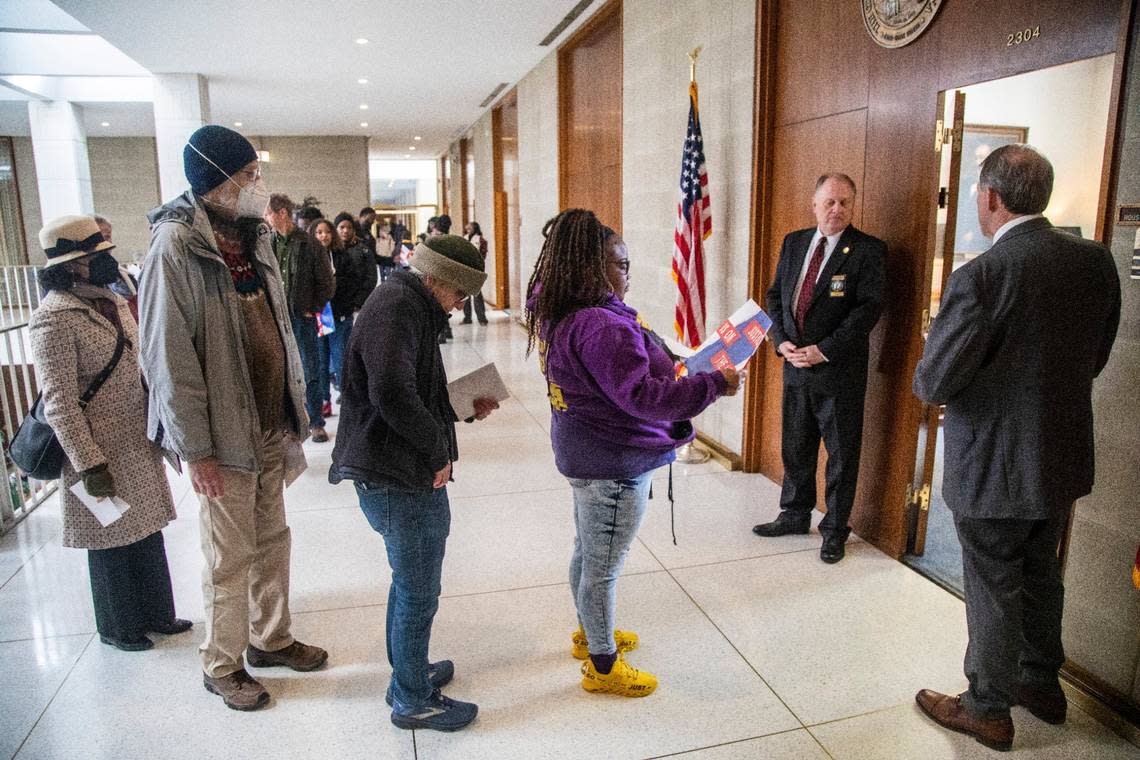NC Supreme Court hears a new round of arguments in partisan gerrymandering case
The North Carolina Supreme Court reheard a critical gerrymandering case on Tuesday that could have major implications for new political maps GOP legislative leaders draw later this year.
During Tuesday’s arguments in Harper v. Hall, the state’s highest court revisited the question of whether partisan gerrymandering is forbidden under the state constitution. Just a few months earlier, the court’s outgoing Democratic majority ruled that it was.
Phil Strach, the attorney representing GOP lawmakers, criticized the court’s original ruling last year striking down the legislature’s maps for the U.S. House and its own districts as a “failed experiment” that “created a partisan gerrymandering claim out of whole cloth, out of multiple vague state constitutional provisions that do not say anything about partisanship and redistricting.”
That’s been one of the main arguments Republican lawmakers have made throughout legal challenges over the maps they drew and then redrew last year — that there’s nothing in the state constitution that prohibits partisan gerrymandering.
Attorneys for the voting rights groups that challenged the GOP maps said the real issue is whether maps that are excessively skewed along partisan lines diminish the power of certain voters to have their voices heard.
“The ultimate standard here, is whether voters have substantially equal voting power,” said Lali Madduri, an attorney for the plaintiffs, during a lengthy back-and-forth with Chief Justice Paul Newby.
Tuesday’s arguments followed the court’s recently elected Republican majority agreeing last month, in a rare move, to rehear the gerrymandering case after Republican legislative leaders asked it to consider if the December ruling by the Democratic majority had been wrongly decided.
The state-level case underlies a nationally watched redistricting case at the U.S. Supreme Court, Moore v. Harper, that could decide how much power legislatures have over federal elections.

Controversy over previous ruling and rehearing
Political and legal observers already expected GOP lawmakers to face more favorable conditions if their maps were challenged in court, under the state Supreme Court’s new Republican majority.
The court’s decision to rehear the case, however, indicated that it could issue a dramatically different ruling on partisan gerrymandering, likely making it much harder for future Republican-drawn maps to be challenged on those grounds, The News & Observer reported last month.
Liberal opponents of the maps who sued Republican lawmakers in court blasted the decision to rehear the case so soon after it had been decided, and claimed the only reason the court was taking it up again was because its partisan makeup had shifted in November’s election from a 4-3 Democratic majority to a 5-2 Republican one.

Justice Michael Morgan, one of two Democrats on the bench, also alluded to the fact that control of the court had shifted.
“What has happened over the course of the past 88 days since we issued our opinion in this case, that would mandate and compel a different result?” Morgan asked Strach, the attorney for Republican lawmakers.
Strach replied that the court’s December decision itself compels a different result, since it showed that the original ruling issued in February was flawed. Strach also said the court’s recent ruling should be withdrawn and the original ruling should be overruled.
GOP legislative leaders have said the court’s outgoing Democratic majority acted improperly by ruling on the case after voters had elected a Republican majority to the bench.
Asking the court to rehear the case in January, House Speaker Tim Moore said voters had “sent a message” on Election Day and had “clearly rejected the judicial activism of the outgoing majority.”
Senate leader Phil Berger, meanwhile, said last month that the court’s “lame-duck” Democratic majority ruled on the case in an expedited manner, “in a clear attempt to inject politics into the court’s decisions.”
Common Cause NC, a watchdog organization, led a march between the North Carolina Legislative Building and the state Supreme Court building ahead of the arguments to draw attention to the case and a second one on North Carolina’s voter ID law being heard over Wednesday.
“Gerrymandering is always wrong regardless of who does it,” said Bob Phillips, executive director of Common Cause NC, one of the plaintiffs in the case. “The people of North Carolina know this, we know that, the lawmakers know this, and I would, respectfully, say that the justices hearing the case later today also know it. Gerrymandering causes incalculable harm, more than any other thing. It is responsible for the polarizing landscape that exists today, the toxic partisan divide that permeates everything.”

Repeated rounds of redistricting also confuses voters, North Carolina Democrats in Congress said in a news conference.
Rep. Deborah Ross, a Democrat from Wake County, said because North Carolina has so frequently been forced to redraw congressional districts due to gerrymandered maps, she’s heard from constituents that they have no idea anymore who represents them.
Rep. Valerie Foushee, a Democrat from Orange County, said her district has had three different boundaries since 2010.
”We see voting rights are under attack by the Republican-led legislature. That’s right here in North Carolina,” Foushee said. “For decades, we have seen blatant racial partisan gerrymandering by the North Carolina General Assembly attempting to dilute and silence the voices of millions of disenfranchised voters, particularly Black voters and people of color.”

Supermajorities, checks and balances
Speakers at Tuesday’s march promised to take to the streets for justice. They also called on Gov. Roy Cooper, a Democrat, to use his authority to ensure checks and balances remain in the court system to ensure the legislature doesn’t continue without unchecked power.
“A year ago, the state Supreme Court made the right call,” Phillips said. “What this Supreme Court does is unknown, but if gerrymandering is legalized, history will judge those who make that decision and those pushing for it will pay a political price with ‘we, the people’ of North Carolina.”
December’s ruling by the court’s Democratic majority allowed the state House map used in last year’s election to stay in place, but said that the state Senate map was unconstitutional and needed to be redrawn.
Republicans won 30 out of 50 seats in the Senate last year, giving them a supermajority to enact legislation over vetoes by Cooper. In the House, however, Republicans fell one seat short of the necessary threshold, which means that GOP lawmakers need the support of at least one House Democrat to override Cooper’s vetoes.
Supreme Court justices also heard arguments Tuesday over whether, and when, the legislature could draw new maps if the court reverses the decision that led to the current maps.
Lawmakers are expected to redraw legislative and congressional maps this summer, after they finalize and pass a new state budget. Cooper cannot veto district maps.
